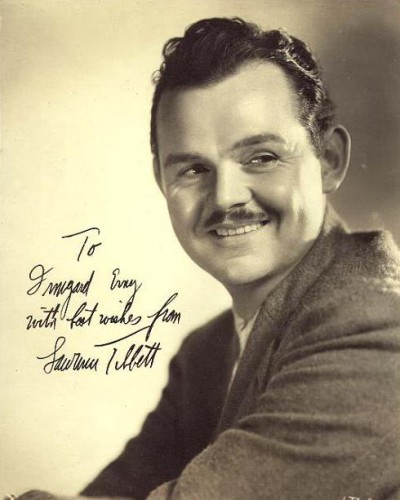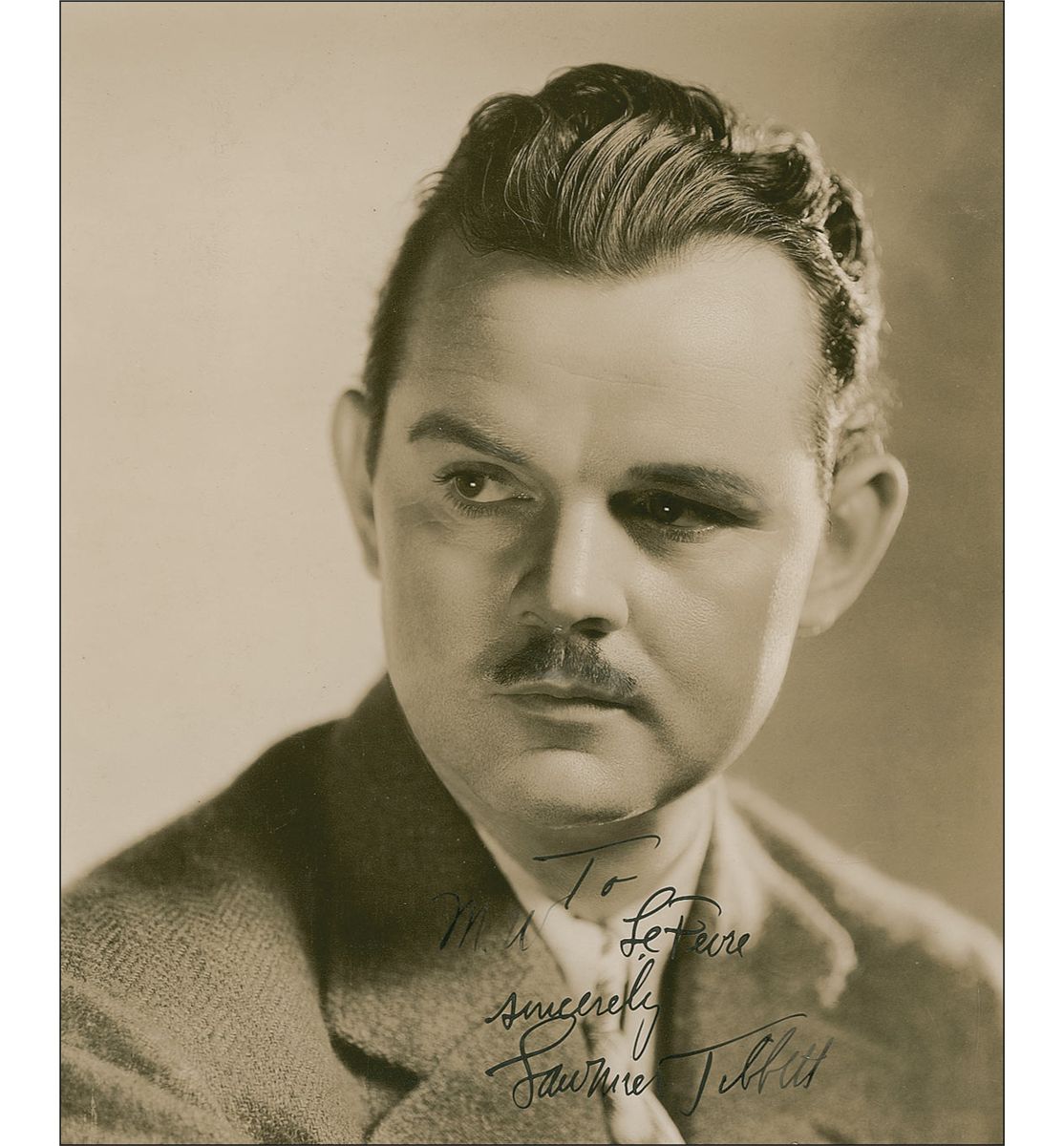Lawrence Tibbett (Lawrence Mervil Tibbett)

Lawrence Tibbett was born Lawrence Mervil Tibbet (with a single final “t”) on November 16, 1896 in Bakersfield, California. His father was a part-time deputy sheriff, killed in a shootout with desperado Jim McKinney in 1903. Tibbett grew up in Los Angeles, earning money by singing in church choirs and at funerals. He graduated from Manual Arts High School in 1915. A year later he met his future wife, Grace Mackay Smith, who rented a room in his mother’s house. During World War I he served in the Merchant Marine, after which he found employment singing as prologue to silent movies at the Grauman “Million Dollar” Theater in downtown Los Angeles. Lawrence Tibbett studied in New York City with Frank La Forge and in 1923 at the age of 26, he signed his first contract, for $60 per week, with the New York Metropolitan Opera, using the name “Tibbett” (a spelling he had used occasionally in his youth). Over the ensuing years, with the Met, he built a hugely successful career, displaying an outstanding voice, immaculate musicianship, and a strong stage presence. His Met roles included Valentin in Charles Gounod’s Faust, Silvio, and later, Tonio, in Ruggiero Leoncavallo’s Pagliacci and the King’s Herald in Richard Wagner’s Lohengrin. He first achieved national recognition playing Ford in Giuseppe Verdi’s Falstaff. Lawrence Tibbett traveled to California in 1927 to sing the lead role in the Grove Play St. Francis of Assisi, and it was during that trip to San Francisco when he met ex-New Yorker Jennie Marston Burgard, whom he married in 1932. During the 1930s, Tibbett toured Europe and Australia, performing on stage or giving recitals in London, Paris, Prague and Vienna as well as in Sydney and Melbourne.
Lawrence Tibbett made his first recordings for the Victor Talking Machine Company in 1926. In the early 1930s, Tibbett also appeared in movies. His Hollywood sojourn proved brief, although he was nominated for the Academy Award for Best Actor for his first film, The Rogue Song, a 1930 Metro-Goldwyn-Mayer production with Laurel & Hardy, shot in two-color Technicolor (Only a few minutes of footage of the film, as well as the complete soundtrack, is known to survive today). Soon afterward, he starred in another MGM musical film, New Moon, opposite Grace Moore and The Cuban Love Song (1931), with the Mexican Spitfire, Lupe Vélez. In 1935, he made Metropolitan for 20th Century Fox. This film is notable for its extensive segments of Tibbett performing operatic arias in a stage setting. His final film was Under Your Spell in 1936. Also during the 1930s, Tibbett had a domestic radio program sponsored by the Packard Motor Car Company of America on which he sang formal music. The company chose him to announce the Packard 120 to the world on air; he drove one. When the firm wanted to sell less expensive cars, they persuaded him to add popular tunes to his repertoire in order to boost sales. He also appeared on Your Hit Parade. Together with violinist Jascha Heifetz, in 1936 he founded the American Guild of Musical Artists, the most important labor union for solo performing artists. He was the Guild’s proactive president for 17 years. His forceful and articulate advocacy of artistic causes was unique in its day. After his operatic career concluded, in the early 1950s Tibbett performed in musicals and plays. He spent a summer in stock as the Reverend Davidson in Rain and played Captain Hook in a short-lived tour of the John Burrell staging of Peter Pan that was mounted for Jean Arthur and featured a musical score by the young Leonard Bernstein. Veronica Lake played Peter. Most notably, Tibbett took over the Italian operatic bass Ezio Pinza’s role in Fanny during its original Broadway run.
In later years Tibbett served as host of a radio show featuring recordings of operatic singers. He leavened matters with reminiscences of his own stage experiences. Plagued by severe arthritis and drinking problems, he aged prematurely as his health worsened. He died on July 15, 1960, after hitting his head on a table during a fall in his apartment. The Time obituary said of him: “Tibbett had a big, bronzelike, dramatically eloquent voice that combined ringing power with remarkable agility … he left behind not only the echoes of a great voice but the memory of a performer who could feel equally at home with high art and popular entertainment, suggesting that there is a magical link between the two.” Tibbett’s operatic recordings made in the United States during the 1920s and ’30s are regarded as among the finest of that period. Many of them are available on CD re-issues. A comprehensive story of his personal life and musical career, Dear Rogue: A Biography of the American Baritone Lawrence Tibbett, by Hertzel Weinstat and Bert Wechsler was published in 1996 by Amadeus Press of Portland, Oregon.
Born
- November, 16, 1896
- USA
- Bakersfield, California
Died
- July, 15, 1960
- USA
- New York, New York
Cause of Death
- accidental fall
Cemetery
- Forest Lawn Memorial Park (Glendale)
- Glendale, California
- USA



